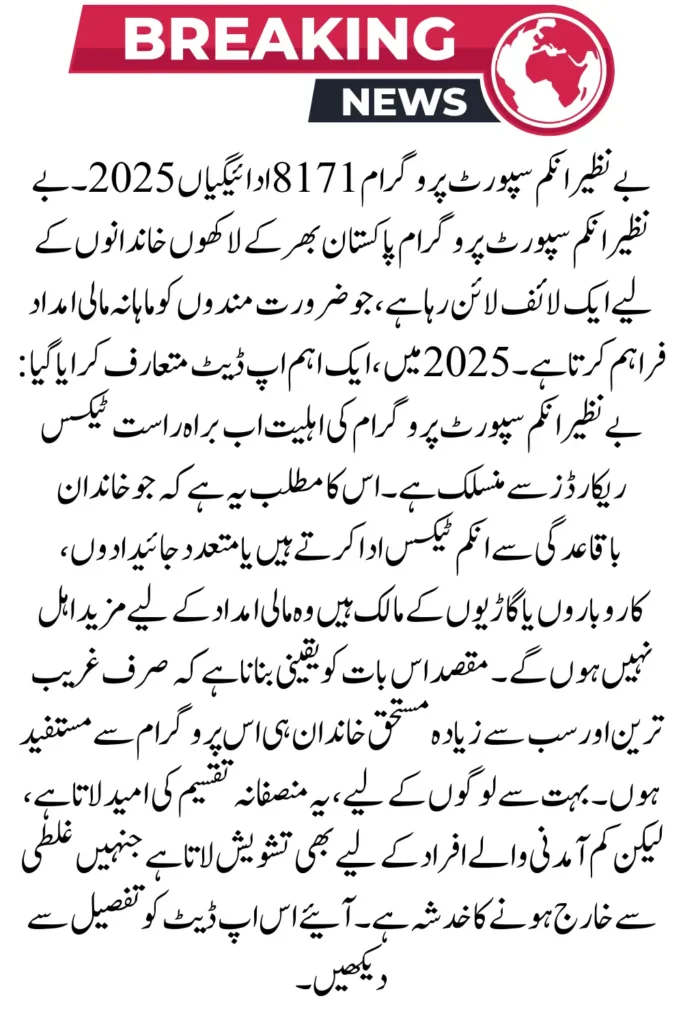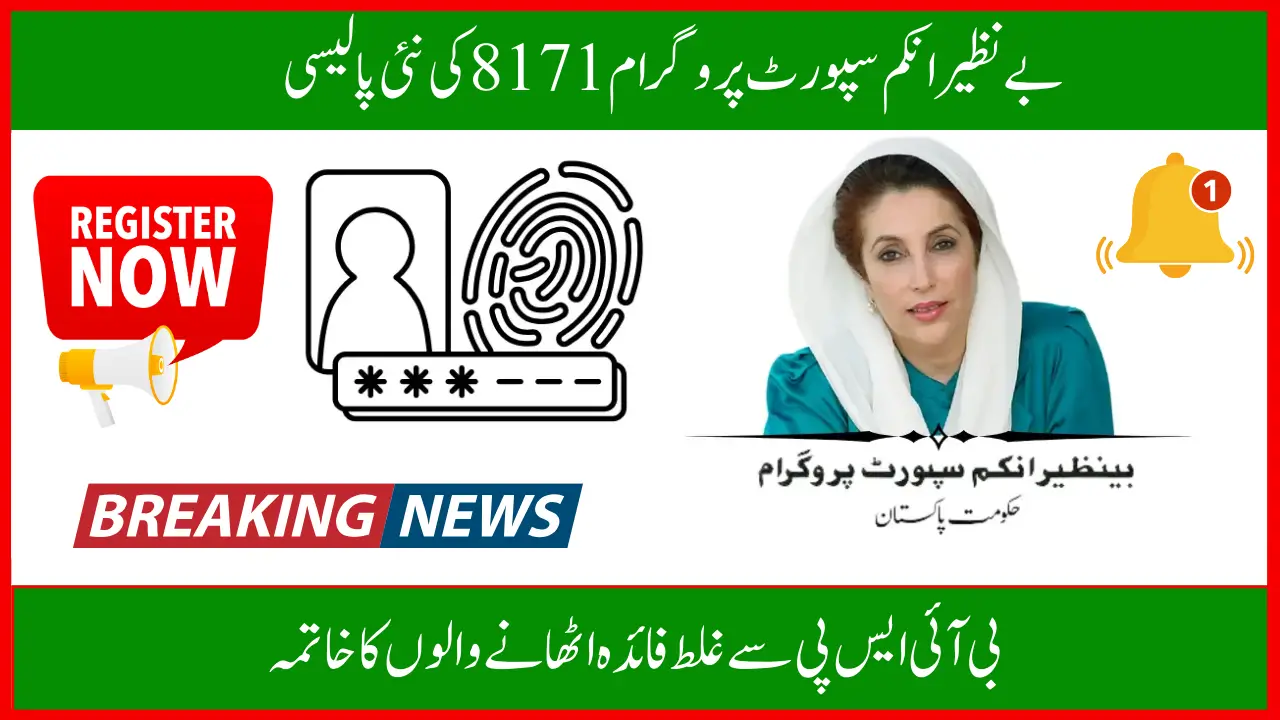BISP 8171 Payments 2025
BISP 8171 Payments 2025. The Benazir Income Support Program has been a lifeline for millions of families across Pakistan, providing monthly financial assistance to those in need. In 2025, a major update was introduced: BISP eligibility is now directly linked to tax records. This means that families who pay regular income tax or own multiple properties, businesses, or vehicles will no longer qualify for financial aid. The goal is to ensure that only the poorest and most deserving families benefit from the program. For many, this brings hope of fairer distribution, but also concern for low-income earners who fear being excluded by mistake. Let’s explore this update in detail.
Government Announcements – Tax Records Now Linked to BISP
The Ministry of Poverty Alleviation and Social Safety confirmed that tax data from the Federal Board of Revenue (FBR) will now be cross-checked with BISP’s database. This reform was rolled out as part of the September 2025 updates.
Key highlights of the new policy:
- Taxpayers are no longer eligible for monthly stipends
- Families owning vehicles, properties, or multiple bank accounts will be excluded.
- Women remain the primary recipients to ensure fair distribution.
- Complaint centers have been set up for families wrongly marked as ineligible.
This change comes after reports revealed that some relatively well-off families were still receiving aid, while truly poor households were left behind.

Updated BISP 8171 Payment Structure 2025
The government has slightly adjusted monthly stipends to match inflation. Payments now depend on the poverty score and the financial background of families.
| Category | Eligibility | Monthly Stipend (PKR) | Additional Benefits |
| Extreme Poverty | No income, no assets, score below 20 | 12,000 | Free ration + Sehat Card |
| Low-Income Families | Score 21–35, no tax records | 9,000 | Subsidized electricity bills |
| Needy Households | Score 36–50 | 6,000 | Education stipends for children |
| Taxpayers/Property Owners | Linked with FBR records | Not Eligible | — |
This clearly shows how tax records directly affect BISP eligibility
Relief & Support Operations
To make sure that funds reach the right people, the government has improved relief and verification operations:
- Over 2 million families verified using FBR–BISP data.
- 300,000 ineligible beneficiaries were removed in 2025.
- Digital verification centers have been established in 100 districts.
- Mobile vans launched to help rural families check eligibility.
These steps reduce middlemen involvement and bring services closer to people’s homes.
Future Plans to Support Families
The government has made it clear that BISP is not just about financial handouts, but also about long-term poverty reduction.
Planned initiatives include:
- Skill development programs for unemployed youth.
- Interest-free loans for small businesses.
- Educational stipends to reduce school dropouts.
- Digital banking expansion to improve transparency.
By removing ineligible families, the government aims to redirect funds towards sustainable development programs.
Anti-Corruption Measures
The update is also a step toward stopping fraud and corruption in the system.
- Fake beneficiaries removed from lists.
- Agents charging illegal fees have been arrested.
- FBR audits are being used to detect fraudulent claims.
- Helpline 0800-26477 launched for complaints and appeals.
These actions help ensure that support only reaches those who truly need it
Impact on Families – Stories from the Ground
The new reforms have had mixed reactions among beneficiaries.
- In rural Sindh, a widow expressed relief: “Now only the poorest are protected, and wealthy families will not take our share.”
- In Punjab, daily-wage workers worried that small bank accounts might wrongly mark them as ineligible.
- The Prime Minister reassured citizens in a public address:
“No genuine poor family will be left out. The system is designed to protect the weakest and ensure fairness.”
This highlights the balance between fairness and compassion in the new policy.
Conclusion
The BISP 8171 Payments 2025 represents an important shift in the welfare system of Pakistan. By connecting eligibility with tax records, the government is making its policy more just and reducing fraud; however, this also requires ongoing oversight to guard against unintentional exclusion of eligible families. The future of BISP, with spoilers, complaint centres, and anti-corruption notes, will function therapeutically in the orbit of improving transparency, fairness, and empowerment—not just helping families in acute conditions survive, like hand-to-mouth existence, through other forms of economic production, but, rather, envision a better future.
FAQs – BISP 8171 Payments 2025
Q1: How do tax records affect eligibility?
If you are a taxpayer or own property/vehicles, you will not qualify for BISP payments.
Q2: How much financial support can families receive?
Eligible families get between Rs. 6,000 and Rs. 12,000 per month, depending on their poverty score.
Q3: What if I am wrongly marked as ineligible?
You can file a complaint via helpline 0800-26477 or visit the nearest NADRA/BISP center.
Q4: Can women apply if their husbands pay taxes?
No. If the household is linked with tax records, the entire family becomes ineligible.
Q5: Are payments still available in rural areas?
Yes. Mobile vans and digital centers in 100 districts ensure access for rural families.
Suthra Punjab Program September 2025 Update – Latest Cleanliness
